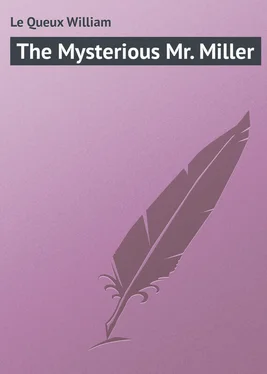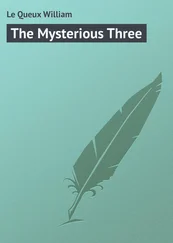William Le Queux - The Mysterious Mr. Miller
Здесь есть возможность читать онлайн «William Le Queux - The Mysterious Mr. Miller» — ознакомительный отрывок электронной книги совершенно бесплатно, а после прочтения отрывка купить полную версию. В некоторых случаях можно слушать аудио, скачать через торрент в формате fb2 и присутствует краткое содержание. Жанр: foreign_prose, на английском языке. Описание произведения, (предисловие) а так же отзывы посетителей доступны на портале библиотеки ЛибКат.
- Название:The Mysterious Mr. Miller
- Автор:
- Жанр:
- Год:неизвестен
- ISBN:нет данных
- Рейтинг книги:5 / 5. Голосов: 1
-
Избранное:Добавить в избранное
- Отзывы:
-
Ваша оценка:
- 100
- 1
- 2
- 3
- 4
- 5
The Mysterious Mr. Miller: краткое содержание, описание и аннотация
Предлагаем к чтению аннотацию, описание, краткое содержание или предисловие (зависит от того, что написал сам автор книги «The Mysterious Mr. Miller»). Если вы не нашли необходимую информацию о книге — напишите в комментариях, мы постараемся отыскать её.
The Mysterious Mr. Miller — читать онлайн ознакомительный отрывок
Ниже представлен текст книги, разбитый по страницам. Система сохранения места последней прочитанной страницы, позволяет с удобством читать онлайн бесплатно книгу «The Mysterious Mr. Miller», без необходимости каждый раз заново искать на чём Вы остановились. Поставьте закладку, и сможете в любой момент перейти на страницу, на которой закончили чтение.
Интервал:
Закладка:
“I do. I should delight to see them,” I answered with enthusiasm; therefore he led me across the low old-fashioned hall with its great oak beams and open fireplace into a long gallery where the floor was polished, and along one side was hung a choice collection of masters of the Bolognese, Tuscan and Venetian schools.
At a glance I saw that they were of considerable value, and as I walked along slowly examining them I half feared lest I might come face to face with the daughter of the house.
Mine was a bold adventure, and surely it was fortunate for me that old Miss Catherine had a headache.
Through room after room he conducted me with all the pride of a collector showing his treasures. Indeed, I was amazed to find such a perfect museum of Italian art hidden away in that picturesque old Manor House. “Yes,” he said presently, as we entered the long old-fashioned drawing-room upholstered in antique rose-pattern chintz, “I’ve collected in Italy for a good many years. One can pick up bargains, even now, in the less frequented towns, say Ravenna, Verona, Bologna or Rimini; while in Leghorn there are still lots of genuine Sheraton and Chippendale which was imported from England by the English merchants of that time. I once made a splendid find of seventeenth-century English silver – two porringers and some spoons – in the Ghetto in Leghorn.”
I was at the moment looking at a circular Madonna on panel, evidently of the Bolognese school of the cinquecento, hanging at the end of the long pleasant old room when, in glancing round, my eye fell upon two small tables where stood photographs in frames.
In an instant I bent over one and recognised it as that of the girl who had come to me so mysteriously at Shepherd’s Bush.
“That is my daughter,” he remarked.
“Curious,” I said, feigning to reflect. “I think I’ve met her somewhere abroad. Perhaps it was in Italy. Could it have been in Leghorn?”
“You know Leghorn?”
“I’ve been there many times. I know the Camerons, the Davises, the Matthews, and most of the English colony there.”
“Then you may possibly have met her there,” he said. “We have a small flat on the sea-front, and my daughter often plays tennis.”
“Of course!” I exclaimed, as though the mention of tennis brought back to me full recollection of the incident. “It was at tennis that I saw her – last season when I was at the Palace Hotel. I remember now, quite well. Our Mediterranean fleet were lying there at the time, and there were lots of festivities, as there are every summer. Is your daughter now in England?”
“Oh, yes. She’s up in London, but returns to-morrow.”
“And are you going back to Italy soon?” I inquired.
“I hardly know. My movements are never very certain. I’m quite a creature of circumstances, and nowadays drift about with the wind of chance,” he laughed.
“But this is a lovely old place,” I remarked. “If I had it I should certainly not prefer a flat in a sun-baked Italian town, like Leghorn.”
“Circumstances,” he remarked simply, with a mysterious smile upon his grey face.
What, I wondered, was his meaning?
Did he really intend to convey that the circumstances of his dishonourable profession compelled him to hide himself in a small flat in that somewhat obscure town – obscure as far as English life went?
When he learnt that I knew some of his friends in Leghorn he became enthusiastic, and began to discuss the town and its notabilities. What did I think of the English parson? And whether I did not think that seeing the small English congregation the church ought not to be removed to some town with a larger English colony. It was absurd to keep a parson there for half a dozen people.
And while my sharp eyes were busy examining the photographs set among vases of fresh-cut flowers, I made replies and sometimes laughed at his witty criticisms of persons known to both of us in “the Brighton of Italy.”
“What a contrast is the quiet rural life here, with all its old-world English tranquillity, to that of the gay, garish, sun-blanched passeggiata of Leghorn, with its bright-eyed women, its oleanders, its noise, movement, the glare and strident music of the café-chantants , and the brightness of the newly discovered spa,” I said.
He sighed, pursing his lips.
“Yes, Mr Leaf, you are quite right,” he answered. “I love Italy, but I confess I very often long to be back here at Studland, in my own quiet old home. Lucie is always begging me to forsake the Continent and return. But it is impossible – utterly impossible.”
“Why impossible?” I asked, looking into his deeply furrowed face.
“Well – there is a reason,” was his response. “A strong reason, one of health, which induces – nay, compels me to live abroad. And I greatly prefer Italy to any other country.”
Little did he dream that I had that secret document of the Italian Detective Department in my possession, or that I had learnt the truth from my friend Sampson, the friend of the young Chilian Carrera.
We were chatting on, having halted at the open window which looked across the old-fashioned garden with its rose arbours, moss-grown terrace and grey weather-beaten sundial, away to the park beyond, when I suddenly crossed to another table, whereon were other photographs.
One of them I thought I recognised even in the distance.
Yes! I was not mistaken! I took it in my trembling hand with a word of apology, and looked into the picture intently. Sight of it staggered me.
“Who is this?” I asked hoarsely, and my host must, I think, have noticed the great change in my countenance.
“A friend of my daughter’s, I think. Do you know her?”
“I knew her,” I replied in a hard, low tone, for sight of that smiling face brought back to me all the bitter remembrance of a part that I would have fain forgotten. “It is Ella Murray!”
“Ah! – yes, that’s her name. I recollect now,” he said; and I saw by his face that he was interested. “I think they were at school together.”
Again I looked upon the portrait of my dear dead love, my eyes fascinated, for I beheld there, at her throat, the small brooch I had given her on her birthday, a green enamelled heart with two hearts in diamonds entwined upon it.
Those sweet, wide-open eyes, clear blue and wondering like a child’s, gazed out upon me; her well-formed lips were slightly parted, as though she were speaking again, uttering those soft words that had so charmed me when she was mine, and mine only. I recollected the dress, too, one she had worn one night at dinner at the big country-house where we had been fellow-guests. Every feature of that lovely face was indelibly photographed upon my memory. Through those dark years, after that paroxysm of grief that had overtaken me when I discovered her false, I had, sleeping and waking, seen that smiling countenance as before my vision. Even in death Ella was still mine.
That smile! Ah! did it not mock me? Had not Avarice and Death cheated me out of Happiness? A great darkness was over my mind, like the plague of an unending night.
I set my teeth, swallowed the lump that arose in my throat, and with a sigh replaced the photograph upon the table.
“A pretty face,” remarked the man whose police record was in my possession.
“Yes, very,” I remarked casually.
Ah! what a storm of bitter recollections surged through my burning brain.
Had she but lived and loved how different would my own wasted, aimless life have been!
Yes. She was, after all, my dear dead love – my Ella!
Chapter Ten
My Own Confession
The “Lion” Inn was a pleasant, old-fashioned little hostelry overlooking the bay, with Bournemouth beyond the distant haze. My room was small and clean, with white dimity curtains and hangings, and framed religious texts upon the walls. As I sat at the window in the hour before my dinner was ready, I reflected upon the strange incidents of those past few days – a chain of curious circumstances that seemed to enmesh and to entangle me.
Читать дальшеИнтервал:
Закладка:
Похожие книги на «The Mysterious Mr. Miller»
Представляем Вашему вниманию похожие книги на «The Mysterious Mr. Miller» списком для выбора. Мы отобрали схожую по названию и смыслу литературу в надежде предоставить читателям больше вариантов отыскать новые, интересные, ещё непрочитанные произведения.
Обсуждение, отзывы о книге «The Mysterious Mr. Miller» и просто собственные мнения читателей. Оставьте ваши комментарии, напишите, что Вы думаете о произведении, его смысле или главных героях. Укажите что конкретно понравилось, а что нет, и почему Вы так считаете.












